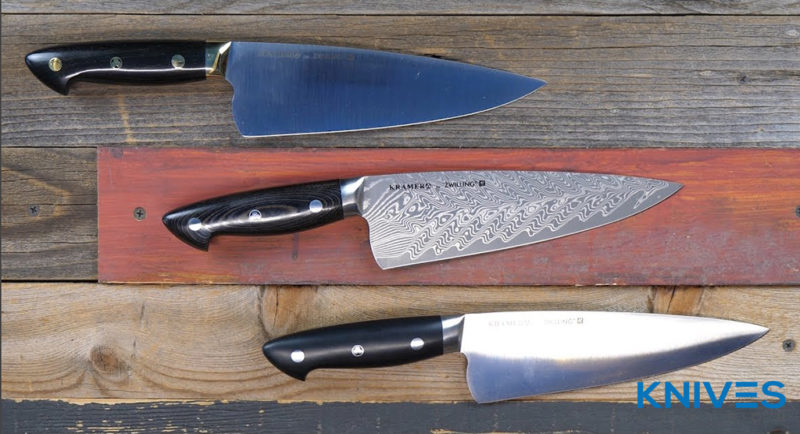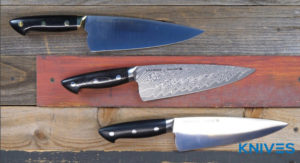When choosing knives, one of the most important elements to consider is the materials from which the blades are made. This is important regardless of whether you enjoy cooking at home or you are a professional chef who buys knives as tools of their trade. There are many different styles and types of knives available that use various materials.
Two of the most common materials used for knife blades are Damascus steel and carbon steel. So, which is the best of these materials to choose? In this comparison of Damascus vs carbon steel, we provide an overview of the pros and cons of each of these materials.
What is Damascus Steel?
Damascus steel is a traditional material that is used for both knives and swords. Although the steel was traditionally forged in countries such as Sri Lanka and India, it is named after Damascus, which is the capital city of Syria. This may relate to the fact that swords made from this metal were once sold in Damascus or it may relate to the patterns that are hammered into the metal.
Modern knives made with Damascus steel are replicas where manufacturers have attempted to copy the original methods that were used to make Damascus steel products. A range of manufacturing techniques are used to do this. Usually, manufacturing modern Damascus steel involves folding together different grades of steel to create the pattern associated with traditional Damascus steel.
The Pros and Cons of Damascus Steel
For many chefs, a knife made from Damascus steel is their knife of choice. This is because it has many plus points that make this type of blade a great choice for a professional chef. Some of these include:
- Durability- Damascus steel is a durable material, so knives that are crafted from Damascus steel are designed to last.
- Sharpness- Damascus steel is exceptionally sharp and will usually retain a sharp knife edge for longer than Damascus steel.
- Aesthetics- Many chefs like the visual appeal of Damascus steel as it has distinctive patterning. It looks far more attractive than carbon steel.
- Tradition- There is a greater sense of tradition when using a knife made from Damascus steel, whereas carbon steel knives have a modern feel. Some people prefer to use items with a sense of tradition behind them rather than modern alternatives.
- Combination of steels- Damascus steel has layers of both hard and soft steel. While the hard steel gives the knife its cutting power, the soft steel is shock absorbent.
However, there are also some negative aspects of Damascus steel that make other options seem preferable. These are:
- Not stain-resistant- Damascus steel is prone to getting stains, which is something that some chefs find undesirable.
- Not rust-resistant- This material is not rust-resistant, so it will begin to corrode and leave rust marks on the blade.
- Expensive- Damascus steel knives are often more expensive than carbon steel knives. This means that it is not always the best option for those with a limited budget.
What is Carbon Steel?
For a steel to be classed as carbon steel, it must have a carbon element of at least 2.1%. This type of steel also contains various other alloys, and these will vary significantly from one steel to the next.
Carbon steel has limitations on the amount of copper, manganese, and silicon that is included. However, there are no limitations on the percentage of many other alloys. These include vanadium, zirconium, chromium, nickel, titanium, cobalt, molybdenum, tungsten, and niobium.
The higher the level of carbon in a steel, the harder and stronger it becomes when heat treated. For this reason, many knife blades are made from high carbon stainless steel.
The Pros and Cons of Carbon Steel
With regard to Damascus vs carbon steel, carbon steel is probably the most commonly used material for modern knife blades. This is because it has many benefits, including:
- Hardness-Carbon is a hard element and the higher the level of carbon, the harder the knife blade. It is this hardness that gives them their powerful cut.
- Durability- A knife made from carbon steel is almost indestructible and they are made to last a lifetime.
- Sharpness- Not only is a carbon steel knife super sharp, but it is also one of the easiest materials to sharpen using water stones or other sharpening tools.
- Edge retention- A carbon steel knife blade has excellent edge retention, and this means you will not need to sharpen your knives as often.
- Affordability- Carbon steel is more affordable than both Damascus steel and stainless steel. Therefore, it is one of the better options in terms of price.
Like all materials, there are also some downsides to carbon steel. These include:
- Not rust or stain resistant-It is neither stain nor rust-resistant. Therefore, it will discolor as soon as it comes into contact with acidic food and needs regular cleaning with a stainless steel cleaner to remove the rust marks that will eventually appear.
- Unattractive- Compared to Damascus steel, carbon steel is plain and unattractive. Therefore, it does not hold the same visual appeal.
The Bottom Line
When is comes to Damascus vs carbon steel, is one the better material for knife blades? Both materials share many of the same advantages and disadvantages. Therefore, there is not a lot to choose between them and it is predominantly down to personal preference. However, carbon steel has a slight advantage in terms of the price and the edge retention.
For these reasons, it makes sense to choose a carbon steel knife over a Damascus steel knife if you have the option. The only advantage that Damascus steel has over carbon steel is that it is more aesthetically appealing and many chefs like the look of knives made from this material.

